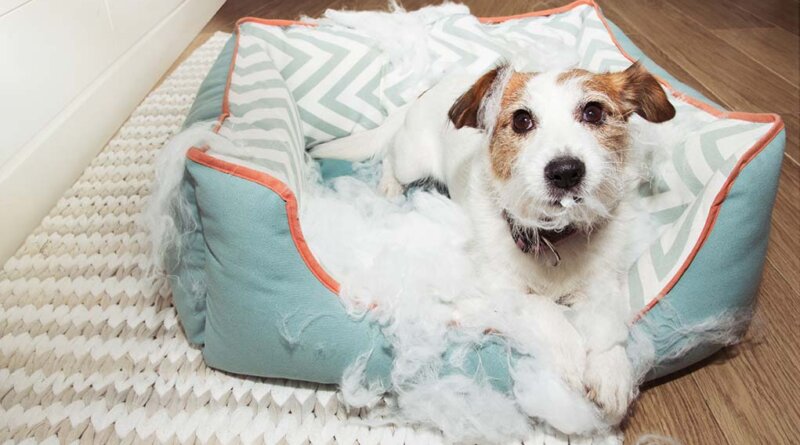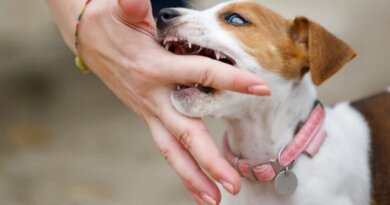10 Tips on How to Stop Dog from Chewing Bed
You just came home to yet another completely destroyed dog bed. It’s the third one you’ve bought.
There are two main reasons why your dog is chewing bed: anxiety (stress) and boredom.
A less common cause is pica in dogs. Fortunately, there are ways you can stop this behavior after you identify the exact cause.
Several types of anxiety in dogs exist, but the most common that causes excessive chewing in dogs is separation anxiety, when your pooch is left home alone.
Another cause of this is stress due to something in the environment, making the dog nervous or uncomfortable (e.g. noises like fireworks or thunder, new pet or person in the house).
Boredom may also cause your dog chewing bed because they don’t have a healthy or alternative outlet for energy release (e.g. the dog is left alone for long periods without exercise, playtime or mental stimulation).
Pica is a less commonly seen reason why your dog is chewing bed.
It is when an animal is compelled to eat things that are not edible (drywall, beds, rocks, socks).
This condition can be caused by malabsorption in a dog’s diet, parasites or a mental issue such as stress or separation anxiety.
If your dog is chewing foreign objects, other than just their bed, make an appointment with your veterinarian for a full diagnosis and treatment plan.
4 Ways to Fix Anxiety-Induced Dog Bed Chewing
Identify and Eliminate the Stressors
If your pup is stressed over a new pet or family member in the household, establish new boundaries and make proper introductions to ease their anxiety.
Use barriers such as pet gates to keep the dog separated until they become accustomed to the smell, sight and the whole situation.
When it’s outdoor noises (thunder or fireworks) that are stressing your dog out, move their bed further away from the window, or door, or other irritants.
Try other proven methods that work for dogs with fear of thunder and fireworks. Consider soundproofing a room if that’s a possibility.
It’s important to never punish a dog with anxiety issues, because it will only create more fear and stress, which will escalate the behavior.
Distracting your pet and redirecting their “bad” behavior is the most effective method.
Use Calming Aids for Dogs
There’s a number of different products designed to relieve anxiety and stress in dogs, such as calming sprays, anxiety vests, specific dog toys, pheromone calming collars, essential oils, calming dog treats and, finally, medicine.
Pheromone-induced calming sprays/collars were shown in studies (PDF) as very effective.
They mimic the pheromones produced by a mother dog, which naturally calms the animal. They’re available as diffusers and wipes as well.
All of these can be used to treat anxiety issues and prevent dogs from chewing beds, but they may take time to work and must be reapplied regularly.
Some of our favorite calming aids for dogs:
Provide Background Sound
Studies show that music/sounds is an effective way to calm dogs down, and relieve stress and anxiety in pets.
To stop dog from chewing bed, play some classical music whenever your pooch begins stressing out, or use a white noise machine instead.
You can also turn on the television or radio when you leave your home to provide your pet with an “artificial companion.”
Make sure the music is calming (YouTube and Spotify have plenty of calming tunes) and the television isn’t set to programming with loud explosions or thunderous activity as this could make your dog’s anxiety worse.
Call the Experts
If you’re still having trouble finding effective ways on how to stop dog from chewing bed and see that your pooch is extremely anxious, you may need to call your veterinarian or, better yet, a canine behaviorist.
6 Ways to Fix Boredom-Induced Dog Bed Chewing
Exercise Your Dog
Before you leave your pooch alone for a long time, tire them out with at least 30-60 minutes of exercise and playtime.
This is especially crucial if you’re crating your dog with a bed inside, although you should never crate them for more than eight hours at a time.
If you can’t get home for a while, enlist the help of a friend, a neighbor, or a professional dog walker who can take your pet out.
Vigorous exercise will help your dog work out physical and mental tensions, so they won’t have to unleash all of that on the pet bed.
Dog Toys
Not all dog toys are the same.
It’s best to use interactive toys that stimulate your pet’s mind.
These are generally puzzle toys, or those like KONG which can be stuffed with peanut butter, fruits, vegetables, and dog treats.
Interactive toys and puzzle feeders make your pet work for the treat inside, keeping them occupied and mentally stimulated, relieving boredom, stress, anxiety.
Providing your pet with variety of toys can also help (e.g. stuffed, rubber, rope, squeaky, puzzle), which helps them not to get bored and stay mentally stimulated.
Pet Cameras and Robots
If you’re a person that works long hours, and your pet stays alone at home for too long, use a dog camera with a treat dispenser.
There’s a number of good pet cameras like that that help you monitor and even talk to your dog when you’re not at home, all easily controlled through a phone app.
Behavior Modification Training
Training and retraining a dog can be effective.
For example, when you catch your dog or puppy chewing bed, make a loud noise like a clap (to stop the behavior), then redirect the dog’s attention with a chew toy.
Always praise your dog for stopping the behavior and using the toy instead.
This will teach your pooch to associate the inappropriate chewing from the appropriate behavior.
Deterrent Sprays
You may lightly spray your dog’s bed with a spray deterrent.
These products contain ingredients that taste awful so your dog won’t want to continue to chew through the fabric.
They are not harmful to the animal, but they will need to be reapplied to maintain their effectiveness.
Do not overuse it so as not to discourage your dog from sleeping on the bed.
Chew-Proof Dog Beds
Finally, it may not be anxiety or boredom at all – some dogs simply enjoy ripping through the fabric the same way they enjoy dog toys.
In that case, you may need to upgrade your pet’s bed to chew proof dog bed that’s made from a more durable material, or the one that is completely “unchewable.”
Some of our favorite chew-proof dog beds:
In Summary
To find a way of how to stop dog from chewing bed, you must first identify the underlying issue and cause (anxiety, stress, boredom), then proceed with a strategy.
Exercise and tire out your pet to release pent up energy.
Bored dogs also tend to be more destructive, so keep them busy with stuffed, interactive dog toys.
Try calming collars or deterrent sprays. Use the latest technology like pet cameras, or ask a friend or neighbor to take your dog outside during the day.
Lastly, if you have tried all solutions on how to stop dog from chewing bed and nothing has worked, it’s time to talk to your veterinarian or canine behaviorist.
Your dog may be dealing with a condition known as Pica, or other mental health related issues.
READ NEXT: Destructive Chewing – Why Dogs Love to Gnaw and How to Stop This
Want to share this?
Related







